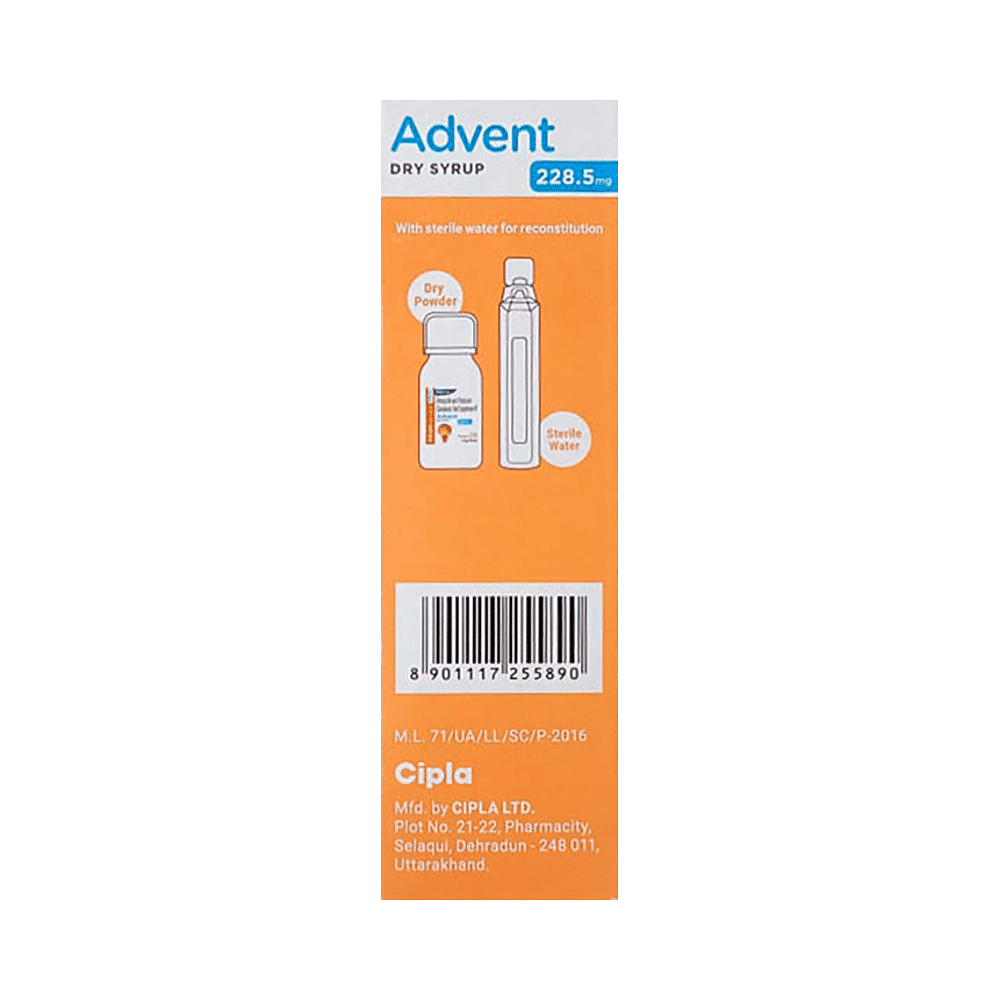
AC-2 Dry Syrup
Manufacturer
Willow Pharmaceuticals Pvt Ltd
Salt Composition
Amoxycillin (200mg/5ml) + Clavulanic Acid (28.5mg/5ml)
Key Information
Short Description
AC-2 Dry Syrup is an antibiotic medicine that helps treat bacterial infections of the ear, nose, throat, chest, lungs, teeth, skin, and urinary tract.
Dosage Form
Dry Syrup
Introduction
AC-2 Dry Syrup is an antibiotic medicine that helps treat bacterial infections of the ear, nose, throat, chest, lungs, teeth, skin, and urinary tract. It is capable of killing bacteria that have become resistant to other therapies and thus also helps treat tuberculosis that is resistant to other treatments.
Directions for Use
Your child must complete the entire course of antibiotics. Stopping too soon may cause the bacteria to multiply again or cause another infection.
How it works
AC-2 Dry Syrup is an antibiotic. It has two active agents amoxycillin and clavulanic acid. Amoxycillin works by preventing the formation of the bacterial protective covering (cell wall) essential for the survival of the bacteria. Whereas clavulanic acid serves a special purpose of inhibiting an enzyme (beta-lactamase) that is produced by resistant bacteria. This makes the combination of amoxycillin and clavulanic acid an effective line of treatment for many types of infections.
Quick Tips
Your child must complete the entire course of antibiotics. Stopping too soon may cause the bacteria to multiply again or cause another infection. Encourage your child to drink plenty of water in case diarrhea develops as a side effect. Never give AC-2 Dry Syrup until and unless prescribed by the doctor. Do not give AC-2 Dry Syrup to treat common cold and flu-like symptoms caused by viruses. Check ‘expiry’ before giving AC-2 Dry Syrup to your child. Immediately discard all the expired medicines.
Related Medicines

Advent 228.5mg Dry Syrup Tangy Orange

Kramox CV Dry Syrup

Pencimox CV Dry Syrup

Moxineo Dry Syrup

Clavomost Dry Syrup

Pelmox CV Dry Syrup

Ticmoxy BD Dry Syrup

Jomoxlin Clav Dry Syrup

Amoxyoj CV Dry Syrup

Lavimoxy Dry Syrup
Frequently asked questions
Can other medicines be taken simultaneously with AC-2 Dry Syrup?
It's important to inform your child's doctor about any other medications your child is taking before starting AC-2 Dry Syrup. They can provide guidance on potential interactions and safe usage.
Can I get my child vaccinated while on treatment with AC-2 Dry Syrup?
Generally, antibiotics do not interfere with vaccines or cause adverse reactions in children who have recently been immunized. However, it's crucial to avoid administering the vaccine until your child has fully recovered from the illness before starting treatment.
What lab tests are typically performed while taking AC-2 Dry Syrup long-term?
Periodically, a doctor may order kidney and liver function tests to monitor your child's health during prolonged therapy with AC-2 Dry Syrup.
Can I give a higher dose of AC-2 Dry Syrup to my child than recommended?
No, exceeding the recommended dosage of this medication can increase the risk of side effects. In case of worsening symptoms, consult your doctor for re-evaluation.
Can I stop giving AC-2 Dry Syrup to my child once their symptoms subside?
No, do not discontinue the medication unless you've completed the prescribed course. Even if symptoms improve before the infection is fully cleared, continue treatment as it may still be beneficial.
Does AC-2 Dry Syrup cause diarrhea in children?
Yes, AC-2 Dry Syrup can induce diarrhea as an antibiotic that targets harmful bacteria. Additionally, the medication may alter the balance of helpful bacteria in your child's stomach and contribute to diarrhea. Encourage drinking fluids for your child if experiencing diarrhea. If it persists or you notice signs of dehydration like dark or strong-smelling urine with reduced urination frequency, consult a doctor before administering any other medications.
Can all viral common colds lead to secondary bacterial infection?
Viral infections are typically not followed by secondary bacterial infection. It is important to avoid administering antibiotics in the case of viral infections as it can increase the risk of side effects and complications.
Is yellow-green mucus from my child's nose a sign of a potential bacterial infection?
Yellow or green mucus from the nose is not necessarily an indication of a bacterial infection. During a common cold, it's normal for mucus to thicken and change color. Symptoms often resolve within 7-10 days.
What signs require immediate medical attention for my child?
Call your child's doctor immediately if they experience severe allergic reactions (difficulty breathing, skin rashes), gastrointestinal infections (diarrhea), or liver damage (weakness, paleness, vomiting). While rare, these side effects are serious and necessitate expert attention.


